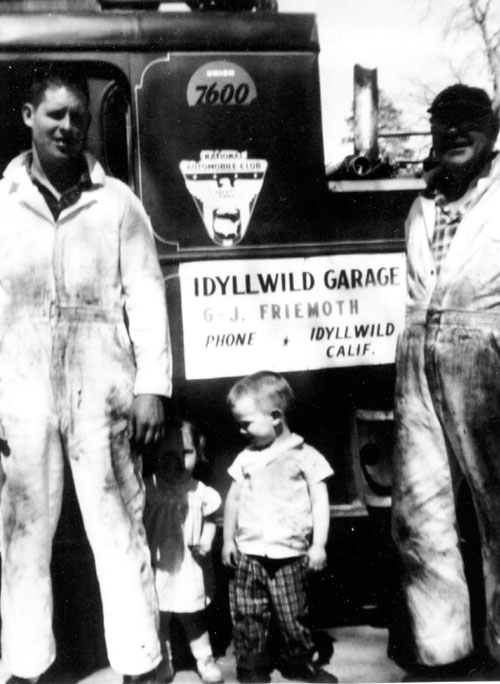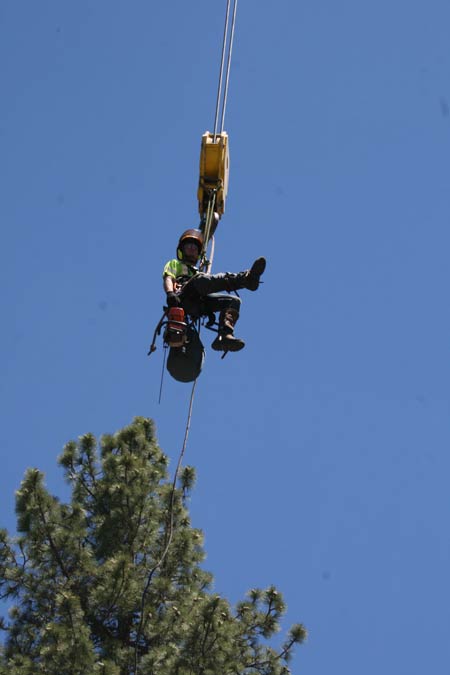Idyllwild Water goes into Stage 1 water emergency
The Idyllwild Water District directors held a marathon meeting Wednesday, Oct. 17. While only eight audience members attended and their comments contributed to the four-and-a-half-hour meeting, the board itself carefully and patiently covered a variety of issues.
Familiar topics such as water quality and the Consolidation Committee, new topics such a public hearing for entering Water Emergency Stage 1, recent topics such as revising the general manager’s job description were balanced with a common group of subjects, such as pipelines on Oakwood and fire suppression for the Idyllwild Community Center, which all focused on the general manager’s authority to make decisions versus his responsibility to inform and work with the board.
The meeting ended with a surprise when Director David Hunt announced he planned to submit his resignation after the November regular meeting.
Hunt was appointed to the board on March 21. He replaced former Director Geoffrey Caine who had resigned in January. Hunt has attended every meeting during his tenure. The term for this seat expires in December 2020.
The issues concerning the general manager’s actions and future are reported in the accompanying story.
After one public comment about the water situation, the board unanimously agreed to enter a Stage 1 water emergency. In November, it will consider a new water shortage ordinance, which may have consequences for water rates during emergency water stages. General Manager Jack Hoagland did confirm that Proposition 218 notices of the meeting and rate implications were mailed.
“Traditionally, since Foster Lake is empty, we would be in some water emergency stage,” said Director Peter Szabadi.
Pine Cove resident Marge Muir was concerned that this action would offset the recent good construction economy in Idyllwild. She argued that new residential construction is required to include water-conserving equipment, such as low-flow toilets.
Under the current ordinance, IWD can issue only 10 new will-serve letters, totaling water and sewer usage for 10 equivalent dwelling units. Hoagland said existing will-serve letters will be honored through the expiration date.
No new information was presented regarding the quality of the district’s water as a result of the interaction of its chlorine treatment with organic compounds in the water. The topic was on the agenda after Hoagland and the district’s legal counsel conferred. They discussed comments during the September meeting regarding the adequacy on the August agenda of the district’s description of the action to purchase a granulated activated carbon filter plant to remove the organic compounds.
In September, it was noted that the August agenda did not clearly identify the action the board might take. It did not explicitly indicate that the board would authorize the purchase of the granulated activated carbon facility for $200,000, including installation. Hoagland told the board that counsel recommended that the conservative and safe step would be to ratify the August decision.
After discussing other options, such as using fluoride as a disinfectant or relying more on the downtown wells, Hoagland again recommended installation of the GAC filter.
During the board’s discussion, Hunt stated his view that this option was being implemented at considerably less than the estimate in the consultant’s report on the cost of the options.
He also mentioned his previous recommendations for a $50 rebate to customers who purchase a home filter and to extend the pipeline beyond the end of Lower Pine Crest. This would eliminate the problem of a dead-end pipe where the pollutants could collect and concentrate. President Dr. Charles “Chip” Schelly asked Hoagland to place the rebate on the agenda for November.
The rebate would need a justification. After a discussion with legal counsel, a true justification does not exist since the district is no longer in technical violation of exceeding standards, Hoagland stated.
After considerable public comment about the problem and solutions, Idyllwild resident Tom Paulek objected to approval of any action before the district completed an analysis of the solutions, pursuant to the California Environmental Quality Act.
“The issue of contamination of water supply is a very serious issue. At the Aug. 15 meeting, the community brought up many alternatives, including flushing, looping and others. All were poorly analyzed by the board members,” he stated. “If ever CEQA was necessary, a project involving contamination of the water supply is it. Do not approve the carbon filter, get a complete analysis.”
Despite Paulek’s opinion, the board unanimously ratified the action taken from the August meeting. Hoagland said he expects delivery of the equipment within nine to 11 weeks, by the end of December.
The report from the Consolidation Committee was brief and affirmed its decision to revise the committee’s name, by deleting “consolidation” from the name. The new name will be, “The Committee to Improve Cooperation Among the Water Districts of the Hill.”
Hunt again recommended the district dissolve the committee and allow a citizens’ group, such as the San Jacinto Watershed Watchdogs, to work the issue.
“Everybody thinks we’re trying to take them over,” he said.
Two members of the public responded. Sue Nash of Idyllwild said, “We’re only doing the right thing for the water district and community. We are not responsible for other people’s actions.”
And Marge Muir, a Pine Cove resident, added, “This is only for the betterment of the mountain. The board of realtors supports the idea.”






